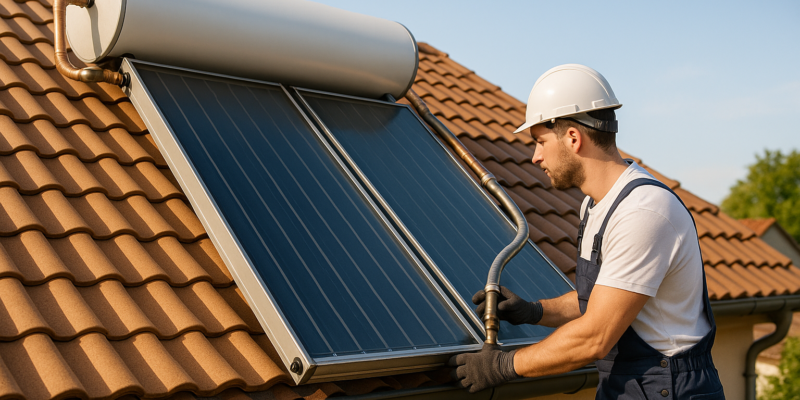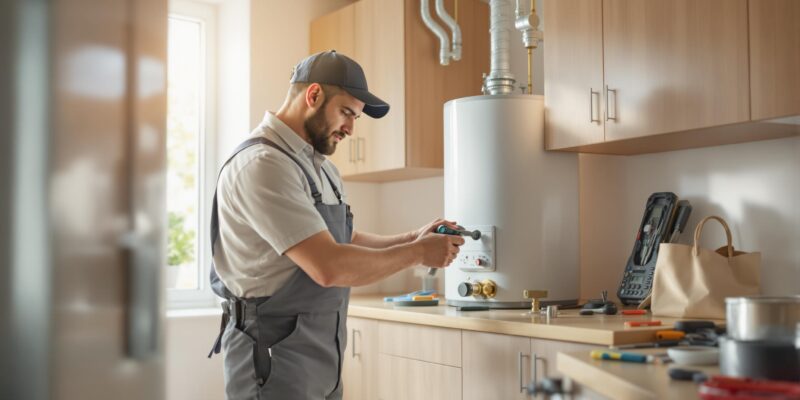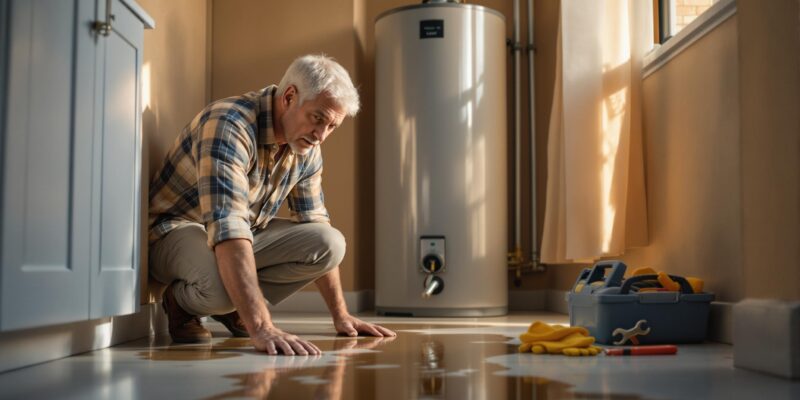Solar vs. Heat Pump Water Heaters: Which Saves More Energy?
When deciding between solar and heat pump water heaters, here’s what you need to know upfront:
- Solar water heaters use sunlight to heat water, reducing electricity needs. They’re great for sunny areas like California or Florida, but they require roof space and good sunlight exposure. Costs are higher upfront, but savings can pay off in 3–7 years.
- Heat pump water heaters use electricity to pull heat from the air and are 2–3 times more efficient than standard electric models. They work in various climates, are compact, and cost less to install initially.
Quick Comparison:
| Feature | Solar Water Heaters | Heat Pump Water Heaters |
|---|---|---|
| Upfront Cost | Higher | Lower |
| Energy Source | Sunlight | Ambient air |
| Best Climate | Sunny regions | Moderate to warm climates |
| Space Needs | Roof space for collectors | Indoor space with ventilation |
Both options cut energy costs, but your choice depends on your home’s layout, climate, and budget. For maximum savings, consider combining both systems if feasible.
How Solar Water Heaters Work and Save Energy
How They Work and Energy Savings
Solar water heaters use sunlight to heat water for home use, offering an efficient way to reduce energy consumption. These systems rely on solar collectors, which can be either flat-plate or evacuated tube types, to capture sunlight. A heat-transfer fluid circulates through the collectors, absorbing the sun’s energy. This warmed fluid then flows to a heat exchanger in the storage tank, where it transfers heat to the water without mixing with it. A small pump keeps the fluid circulating, using only a minimal amount of electricity.
By tapping into the sun’s energy, solar water heaters can significantly cut down on the need for conventional energy sources to heat water. Proper installation and an understanding of how the system works are key to maximizing its efficiency.
Installation Requirements and Limits
For the best performance, solar water heaters should be installed on a sturdy roof with a southern-facing orientation (or within 45° of south) to capture the most sunlight. The installation site should receive direct sunlight, especially during peak midday hours.
Adjusting the tilt of the collectors to match your location’s latitude can further enhance efficiency. However, in areas with frequent overcast skies or during seasons with limited sunlight, a backup heating element might be necessary to ensure a steady supply of hot water.
In colder climates where temperatures can drop below freezing, systems need freeze protection measures, such as antifreeze solutions or automatic drainback mechanisms, to prevent damage to the pipes. Additionally, shading from trees, nearby buildings, or other obstacles can reduce performance, so a detailed site evaluation is essential before installation.
To keep the system running smoothly, regular maintenance is crucial. This includes periodic inspections, cleaning, and ensuring compliance with local building codes and permits. These steps help maintain the system’s efficiency over time.
How Heat Pump Water Heaters Work and Save Energy
How They Work and Energy Savings
After exploring solar water heaters, let’s dive into how heat pump water heaters work and why they stand out for energy efficiency.
Unlike traditional electric water heaters that generate heat directly through electric resistance, heat pump water heaters take a different approach. They pull heat from the surrounding air and transfer it to the water. This is achieved using a refrigerant cycle that includes four key components: an evaporator, compressor, condenser, and expansion valve. Here’s how it works:
- The evaporator absorbs heat from the air, causing the refrigerant to evaporate.
- The compressor then pressurizes the refrigerant, significantly raising its temperature.
- The hot refrigerant gas moves through the condenser coil, where it releases heat to warm the water.
- Finally, the expansion valve cools the refrigerant, resetting the cycle.
This process allows heat pump water heaters to achieve a Coefficient of Performance (COP) between 2.0 and 3.5. To put it simply, for every unit of electricity they use, they produce 2 to 3.5 units of heat. This level of efficiency translates to energy savings of about 60% to 70% compared to standard electric water heaters. For instance, if a household spends $600 a year on water heating with a conventional unit, switching to a heat pump system could cut that cost by more than half.
These systems can even extract heat from air temperatures as low as the 40s °F, although their efficiency does drop in colder conditions.
Climate and Installation Needs
To get the most out of a heat pump water heater, proper placement is key. These systems work best in moderate to warm climates where indoor temperatures remain relatively steady. Areas like the Southeast, Southwest, and parts of California are ideal for maintaining high efficiency year-round. However, they’re still a good option in colder regions when installed in conditioned spaces such as basements, utility rooms, or heated garages.
Most installations are indoors, and it’s important to place the unit in a spot with enough ambient air and adequate clearance for effective heat exchange. Unlike solar water heaters, which depend on specific roof orientations, heat pump water heaters offer more flexibility in placement – as long as ventilation needs are met.
One unique feature of these systems is their cooling effect. By pulling heat from the air, they can dehumidify and slightly cool the surrounding space. This can be a bonus during warmer months but might slightly increase heating demands in colder seasons. Even so, the energy savings from water heating typically outweigh this minor trade-off.
From an electrical perspective, most residential units run on standard 240-volt circuits and can often be installed with minimal changes to existing setups. In colder indoor environments, the system’s backup electric elements may kick in more frequently to ensure a consistent hot water supply, which can lower efficiency. These details highlight how heat pump water heaters differ from solar water heaters and set the stage for a direct comparison.
Heat Pump vs Solar Water Heater
sbb-itb-99db659
Solar vs. Heat Pump Water Heaters: Direct Comparison
Now that we’ve covered the basics of each system, let’s dive into a head-to-head comparison, focusing on installation needs and cost factors.
Comparison Table
Here’s a quick side-by-side look at how these two systems stack up:
| Feature | Solar Water Heaters | Heat Pump Water Heaters |
|---|---|---|
| Initial Installation Cost | Higher upfront investment | Lower upfront investment |
| Installation Space | Requires clear, unobstructed space for solar collectors | Compact design, suitable for tighter spaces |
Key Differences Between the Systems
Solar water heaters come with steeper installation costs and need plenty of open space to set up the collectors. On the other hand, heat pump water heaters are easier on the wallet initially and fit well in homes with limited room to spare. Another important consideration is sunlight – solar systems rely on consistent, direct sunlight, whereas heat pump systems are more adaptable to different environments.
These differences can help steer your decision based on how much space you have and what you’re willing to spend upfront. Up next, we’ll dive into the critical factors to weigh when choosing the best system for your home.
How to Choose the Right Water Heater for Your Home
Choosing the right water heater means finding a system that fits your specific needs. Several important factors come into play when deciding which technology will work best for your home. Let’s break down what you should keep in mind.
What to Consider Before Buying
When weighing your options, it’s crucial to think about how your climate, home layout, and energy goals align with the available technologies.
Climate plays a big role. Solar water heaters are an excellent choice for sunny states like Arizona, Florida, Nevada, and California. These systems can supply consistent hot water throughout the year while reducing energy use significantly. On the other hand, heat pump water heaters are more versatile and perform well in a variety of climates, including cooler or moderate regions. They can cut electricity use by 50% to 70% compared to traditional models. However, keep in mind that extreme cold or high humidity can impact their efficiency, especially if installed in unheated areas.
Your property’s layout matters too. Solar water heaters require enough unobstructed space for collectors and a structure positioned to capture the most sunlight. In contrast, heat pump water heaters are more compact and can fit into smaller spaces, though they still need proper ventilation to work effectively.
For personalized advice, the team at Hydrodynamics can evaluate your home’s climate, layout, and hot water needs to recommend the best system for maximum energy savings.
Combining Systems for Greater Efficiency
In some situations, using both solar and heat pump systems together can boost efficiency even further. A hybrid setup takes advantage of each system’s strengths: solar heating provides primary hot water during sunny days, while the heat pump steps in during cloudy or less sunny periods. This approach works especially well in moderate climates, ensuring reliable performance year-round.
That said, hybrid systems require careful planning. They demand more space for solar collectors, the heat pump unit, and additional plumbing and controls. The upfront costs are higher, but the long-term energy savings can be worth it.
Hydrodynamics specializes in designing and installing both solar and heat pump systems, including hybrid configurations. Their experts can help determine if a combined setup is right for your home and ensure everything runs smoothly for optimal efficiency and savings.
Conclusion: Getting the Most Energy Savings from Your Water Heater
Solar and heat pump water heaters can significantly cut energy costs compared to traditional models, but the best choice depends on your specific needs and location. For example, solar water heaters work exceptionally well in sunny states like Arizona, Florida, and California, where abundant sunlight can help slash energy bills. On the other hand, heat pump water heaters perform reliably across a range of climates and can dramatically reduce electricity consumption compared to standard electric systems. Your local weather conditions and property layout will play a big role in determining which option is right for you.
To maximize savings, it’s essential to select a system that aligns with your household’s hot water usage, local utility rates, and available rebates. Installation requirements also factor into the overall cost and effectiveness of your chosen system.
For those looking to push efficiency even further, combining solar and heat pump technologies can be an excellent option. A hybrid system that integrates both can deliver even greater energy savings, though it requires careful planning and comes with higher upfront costs.
Since 1994, Hydrodynamics has been helping homeowners find energy-efficient water heating solutions. Their team specializes in evaluating your needs and providing expert installation, repairs, and maintenance to ensure your system is perfectly sized and configured for your home.
And remember: proper installation and routine maintenance are key to getting the most out of your water heater, both in terms of performance and energy savings.
FAQs
Is my home a good fit for a solar water heater?
To figure out if your home is a good match for a solar water heater, start by checking for an unshaded area that faces south or toward the equator. This could be a section of your roof or even an open yard – any spot that gets plenty of sunlight throughout the day. You’ll also need enough space for the system, which typically requires about 40 square feet for every 25 gallons of capacity. Make sure the location is sturdy enough to handle the weight of the equipment.
Other factors to consider include the orientation of your roof, potential shading from nearby trees or buildings, and the local climate. To get a clear picture of your home’s suitability, it’s a good idea to consult a professional who can evaluate these aspects and guide you through the installation process.
What kind of maintenance do solar and heat pump water heaters require over time?
Solar water heaters need regular upkeep to stay efficient and last longer. Key tasks include cleaning the solar collectors once a year to clear away dirt and debris. If your system uses antifreeze, it should be replaced every 3 to 5 years. Other important checks include inspecting pumps and thermostats, flushing the tank to remove sediment, and looking for leaks – these should be done every 1 to 3 years. With consistent maintenance, these systems can serve you for 20 to 30 years.
Heat pump water heaters, on the other hand, require less frequent attention. You’ll need to clean or replace the air filters every few months and inspect the evaporator coils annually to make sure they’re clean. It’s also a good idea to check the condensate drain regularly to prevent clogs. Keeping up with these tasks ensures both types of systems run efficiently and last as long as possible.
Can combining solar and heat pump water heaters help save more energy, and what should homeowners consider before installing a hybrid system?
Combining solar panels with heat pump water heaters is a smart way to cut energy costs. Solar panels generate renewable energy that powers the heat pump, reducing dependence on grid electricity and lowering your utility bills. This setup is a great option for homeowners aiming to boost energy efficiency while using greener solutions.
To make this work effectively, a few factors need attention. You’ll need enough space to install both the solar panels and the heat pump system. It’s also important to check that your plans align with local building codes and regulations. Proper integration of the two systems is key to getting the best performance. Hiring a professional installer is highly recommended to ensure everything runs smoothly and delivers the savings you’re aiming for.




